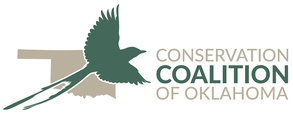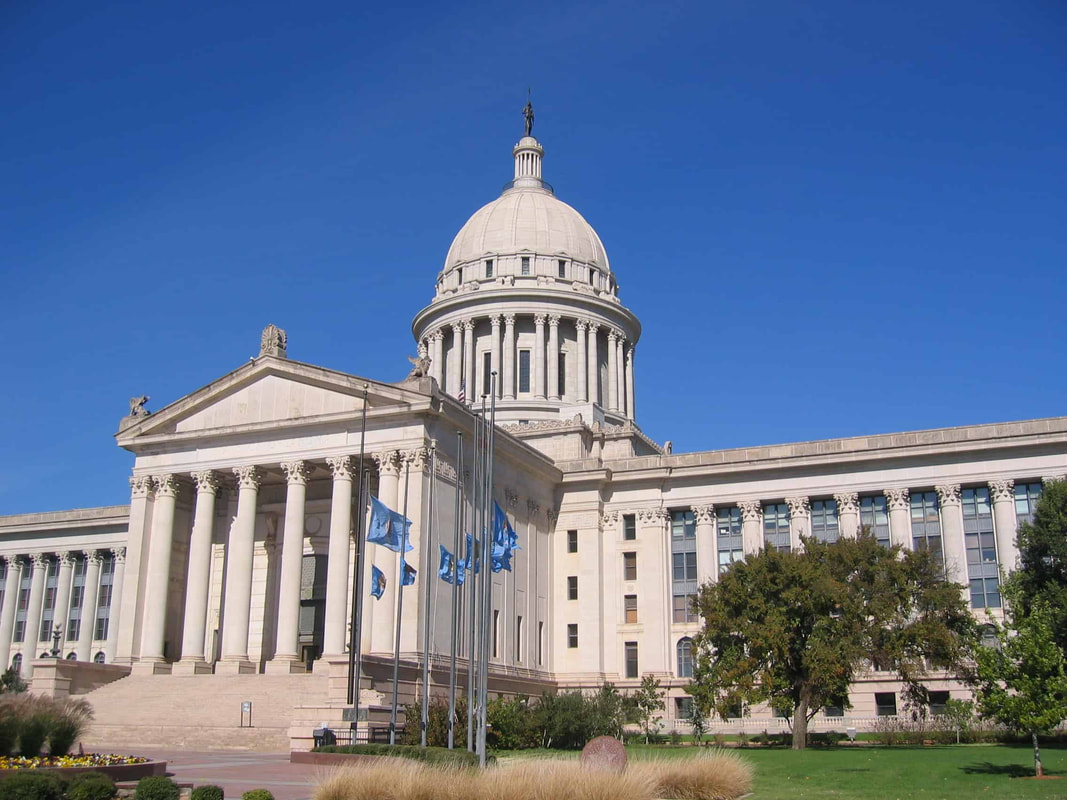Coalition team tracked bills through session marked by turmoilTonya Lee and Matt Latham The 2nd session of the 57th legislature began on February 3rd, 2020 with high hopes from the Republican-controlled Legislature and Governor, who were still in their honeymoon phase. The previous session saw a surplus of revenue where state employees were given pay raises, agency budgets were made whole, additional monies were put into the Rainy-Day Fund, education was funded, and things were looking prosperous for the State of Oklahoma. However, the oil price war in early spring, sent markets plummeting, which in turn sent Oklahoma’s economy into a freefall. Oil companies began laying employees off in record numbers and companies that had been a benchmark for Oklahoma’s work force started filing bankruptcy. Legislative leaders quickly realized difficult financial decisions lay ahead: should the state cut agency and service funding or should the state utilize reserve funds to fill the budget hole and spare core services? Budget negotiations between the Legislature and the Governor quickly soured and devolved into a series of competing press conferences and finger pointing.
Adding to the fractured relationship was the gaming compact dispute between Governor Stitt and the Tribal Nations of Oklahoma. At the end of 2019, Governor Stitt sought to renegotiate certain terms of the gaming compacts by arguing the compacts expired January 1, 2020. Specifically, the Governor stated his intention to increase the exclusivity fees paid by tribes under the current compact. The tribes, on the other hand, argued the compacts auto-renewed. The dispute quickly escalated into a full-fledged public relations war. This skirmish put the Legislature in the crosshairs of the fight, as many legislative districts rely heavily on tribal contributions and many constituents and community leaders are well respected tribal members within numerous legislative districts. The Legislature’s apparent support the tribes over the Governor caused the already fractured relationship to crumble even more. March 11th brought additional tension and turmoil when a visiting Utah Jazz player tested positive for the Covid-19 virus. Much of the state—as well as the nation—came to a screeching halt as local, state, and national leaders grappled with the pandemic. During this time, the legislative session entered its crossover deadline leaving most bills on second reading and hundreds of bills without completed language. After several staff and legislators tested positive for Covid-19, legislative leaders restricted personnel from the capitol building and session came to a halt. Over the next few weeks, the Legislature conducted business via virtual conferences resulting in a joint press conference between the House and Senate of a budget agreement. The Governor expressed his displeasure with the deal as he advocated for cuts to agencies ranging from 7-13% while the Legislature’s agreement dipped into reserve funds to spare agencies. The Legislature convened the first of May and passed three budget bills to balance the FY 21 budget. Less than a week later, the Governor vetoed all three bills. The Legislature had the last word by overriding his vetoes with an almost unanimous margin. During the session, the House and Senate filed two lawsuits against the Governor, the first being after Governor Stitt cancelled the Board of Equalization (BOE) meeting to certify revenue to appropriate for the budget—seemingly in retaliation for the Legislature not adopting his budget recommendations. Without these certifications the Legislature did not know what monies were available. The Legislature asked the courts to force the Governor to fulfill his statutory obligations. Shortly thereafter the Governor called the BOE meeting nullifying the lawsuit. The next suit came when the Governor and two tribes reached a new compact agreement. Leaders of the Oklahoma House and Senate asked the Oklahoma Supreme Court to step in and rule on whether Governor Stitt had the authority to bind the state to gaming compacts that would authorize sports betting and other forms of gambling, which is not authorized by state law. The United States Department of Interior did not take action to disapprove the compacts. The Oklahoma Attorney General issued the following response: The Department of the Interior’s thoughtless and irresponsible inaction on the compacts doesn’t change our conclusion that the governor lacks the authority to enter into compacts that include activities not legal in Oklahoma. The tribes cannot begin operating under the terms of these compacts until the many questions that remain pending before the Oklahoma Supreme Court are resolved. I am deeply disappointed in Interior Secretary Bernhardt’s abdication of his responsibility to all of Oklahoma’s Native American sovereigns, not just two. During all the theatrics and unprecedented events that took place during the legislative session, the Coalition worked feverishly through all the obstacles to ward off punitive legislation and pass legislation to help advance our conservation agenda. Very few bills made it through the process due to the pandemic shutdown, which helped to kill several problematic bills the Coalition team was working hard to defeat. The Coalition’s team of lobbyists tracked 166 pieces of legislation that would impact the Coalition’s member groups—many punitive in nature. The final tracking list can be review below. It should be noted that many bills were “shell bills,” meaning there was not final language due to the session being cut short or did not meet the appropriated deadline before the COVID-19 shutdown. Bill Summary – House of Representatives HB 1099: This was a shell bill with no specific plans to move it forward. HB 1204: This instream flow bill was filed by a freshman legislator. Given the contentious nature of instream flows, the bill did not have a high likelihood of passage. The bill died on second reading after the shutdown. HB 1270: This bill dealt with various permits and fees by the Oklahoma Department of Wildlife Conservation (ODWC). It did not get much momentum and died. HB 1403 This bill sought to establish certain requirements for instream flows. While instream flows are necessary for wildlife and fish habitat, the CCO had several concerns with the bill’s language. As a result, the CCO remained neutral. Ultimately, the bill died after not getting a floor hearing due to potential fiscal ramifications. HB 1423 HB 1423 directed the Grand River Dam Authority to promulgate rules and procedures for the beneficial removal of gravel from the Illinois River system and the Barren Fork River system, as permitted by the Oklahoma Department of Mines. The bill passed through the House 89-0 and passed the Senate 42-0, but had title stricken. Title was never revisited therefore the bill died. HB 1854 HB 1854 authorized a court to order a defendant, upon conviction of violating certain wildlife laws, to surrender a hunting or fishing license to an ODWC wildlife officer. In addition, the measure allows the court to submit electronic documents to the department. The Coalition’s team worked with ODWC to support this measure. Title was stricken in the Senate and never restored. HB 2029 This was a carryover bill from the previous session. As with last session, the Coalition worked closely with ODWC in opposition to this bill as it would result in substantial revenue cuts to the Department. Both Chairman of the Wildlife Committees were authors on this measure which made it difficult to navigate and stop. The committee substitute morphed from creating a three-day special use landowner permit for hunting and fishing on specific tracts of private land as part of a nonprofit event to expanding deer hunting season to the Saturday prior to the fourth Thursday in November, making it 23 consecutive days on private land. The bill ultimately died in the House after not achieving a floor vote. HB 2078 HB 2078 provided clarifying language for wells on platted lands within 600 feet of a municipality’s corporate limits. This bill died in Senate after not receiving hearing in committee. HB 2265 HB 2265 increased the bag limits for antelope season to 210 tags for the landowner permit lottery and 210 tags statewide for the controlled hunt program. The measure authorized the Department of Wildlife Conservation to impose a per-person bag limit on antelope. The Coalition’s team worked with ODWC in opposition to this bill as it removed regulatory authority from ODWC. The measure did not advance from second reading. HB 2534 This bill addressed setbacks from poultry operations. It was a priority for the Coalition, as industrial poultry operations can significantly affect water quality. However, because the bill was authored by a Democrat, Republican leadership refused to allow it to advance. Bill Summary – Senate SB 567 This bill required the landowner or lessee to request a game warden to inform hunters on the owner or lessee’s land that it is necessary to obtain the consent of the landowner or lessee before hunting on the land. The measure further clarifies that the discharge of a firearm cannot be the sole basis upon which a game warden investigates a hunter in the field or enters private property. The Coalition’s team worked with ODWC in opposition of this measure. The bill reduced a game warden’s ability to investigate a potential violation of game laws. It was voted out of committee narrowly with 6-5 vote. Our team, in support of ODWC’s efforts, were able to get it prevented from being heard on Senate floor. SB 702 This bill established a moratorium on certain permits issued to non-coal surface mines located over a sensitive sole source groundwater basins or subbasins. The measure laid out conditions for the termination of the moratorium, including a coordinated technical investigation between the Oklahoma Water Resources Board, the Oklahoma Department of Environmental Quality, the Department of Mines, East Central University, and federal and tribal governmental agencies to study sensitive sole source aquifers (of which the Arbuckle-Simpson Aquifer is the only one in the state) and to develop administrative rules that implement scientific data and facilitate interagency coordination. The Coalition considered this bill a priority. However, given the abbreviated legislative session, the bill did not advance from second reading. SB 703 This bill limited the ability of the Wildlife Conservation Commission to purchase land by requiring any purchases to be contiguous to land already owned by the Commission. The bill further prohibited the Commission from acquiring more land than it sells each year. Public lands is an issue of utmost importance to the Coalition. Because this bill unreasonably sought to hamstring the Commission’s purchase of additional lands, the Coalition worked closely with ODWC to oppose the measure. Title was stricken in committee and did not receive a floor hearing. SB 865 This bill had a different take on instream flows. It stated that any stream water permit issued to take and use water from a definite stream that leaves less than 60% of the annual flow of a Scenic River, 30% of the flow of any other definite stream, or 10% of the annual flow of a stream west of Interstate 35 shall be subject to and junior to any future instream flow appropriation that may reduce the appropriation of the stream’s water. The bill died in early March with no movement. SB 1226 This package modified the term “pollution prevention” to include any practice that eliminates a hazard at the source as well as modifying production processes, promoting the use of nontoxic or less toxic substances, implementing conservation techniques, and reusing materials. The measure also clarifies that the Advisory Councils of the Department of Environmental Quality shall be responsible for creating cooperative partnerships with the business community, municipalities, agencies of the state, and the environmental community. This was a priority for Coalition member Trout Unlimited. The title was struck in order to continue revising the language and the bill did not advance from second reading. SB 1742 This bill restricted the ability of Oklahoma citizens to protest certain groundwater permit applications. This bill was a very high priority for the Coalition for several reasons: the constitutionality of some of the language, limiting the ability of property owners to participate in the OWRB’s administrative process, and authorizing the OWRB’s Executive Director to unilaterally issue non-protested, long-term permits. The Coalition fully expects to see this bill—or some iteration of the same—back next session. The Coalition and member organizations worked diligently with House Leadership to express concerns and had very successful meetings with the Speaker regarding such concerns. The Coalition must be vigilant on this issue next session. Final Thoughts With this past session being cut short resulting in so many pieces of legislation left on the table, the Coalition expects a record number of bills to be filed next session. Other points of interest: candidates are busy running campaigns for the general election in November. The Coalition strongly encourages individuals and member organizations (when possible) to get involved in campaigns in your areas. Assisting in campaigns is the best way to build strong relationships with your legislators. If you do not want to offer campaign assistance, the Coalition encourages you to contact your legislator over the interim and establish a relationship with them. There is NO voice more important to a legislator than that of a constituent. We are happy to provide you with your legislators if you do not know who they are. Looking to next session, here are important dates to mark on your calendar:2020 Interim Studies Request Deadlines:
6/26/2020: Deadline for Representatives to Request House Interim Studies 7/10/2020: Deadline for Senators to Request Senate Interim Studies 7/24/2020: Deadline for the Pro Tem and the Speaker to Approve Interim Studies (Senate & House) and Assign them to Committees 10/30/2020: Deadline to Complete Senate Interim Studies 2020-2021 Legislative Calendar: 12/11/2020: Deadline to Request Drafting of Bills and Joint Resolutions (House & Senate) 1/5/2021 (Noon): Organizational Day 1/21/2021 (4:00 p.m.): Bill Filing Deadline (Bills & Joint Resolutions) 2/1/2021 (Noon): First Day of the First Session of the 58th Legislature 3/11/2021: Third Reading Deadline, Chamber of Origin (Bills & Joint Resolutions) 4/22/2021: Third Reading Deadline, Opposite Chamber (Bills & Joint Resolutions) 5/28/2021 (5:00 p.m.): Sine Die Adjournment! Second Session: 58R 12/10/2021: Deadline to Request Drafting of Bills and Joint Resolutions (House & Senate) 1/20/2022 (4:00 p.m.): Bill Filing Deadline 2/7/2022: First Day of the Second Session of the 58th Legislature 3/17/2022: Third Reading Deadline, Chamber of Origin (Bills & Joint Resolutions) 4/28/2022: Third Reading Deadline, Opposite Chamber (Bills & Joint Resolutions) 5/27/2022 (5:00 p.m.): Sine Die Adjournment! Other Deadlines Not Yet Announced: Deadline for House Interim Studies to be Completed Deadline for Bills & Joint Resolutions to Report Out of Committee, Chamber of Origin Deadline for Bills & Joint Resolutions to Report Out of Committee, Opposite Chamber
0 Comments
Leave a Reply. |
Archives
May 2024
Categories
All
|
Conservation Coalition of Oklahoma
P.O. Box 2751
Oklahoma City, OK 73101
[email protected]



